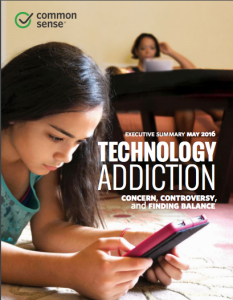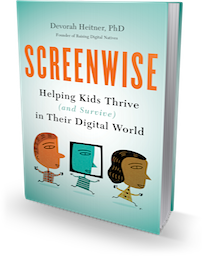 In April, 60 Minutes featured an installment on the fact that our electronic devices are “hacking” our brains. It began: Have you ever wondered if all those people you see staring intently at their smartphones — nearly everywhere, and at all times — are addicted to them?
In April, 60 Minutes featured an installment on the fact that our electronic devices are “hacking” our brains. It began: Have you ever wondered if all those people you see staring intently at their smartphones — nearly everywhere, and at all times — are addicted to them?
The show (you can watch it here) featured technology experts sharing things that programmers do to keep you coming back to your phone, your apps, and your other electronic devices.
This revealing documentary was timely for me. The night before, my husband and I spontaneously headed to our lake cabin after attending a charity event that ended fairly early that evening. Halfway there I realized that my cell phone, iPad, and laptop were all at home.
I’d like to tell you that I just shrugged and told myself that I was going to the lake, after all. Who needs electronics at the lake? Well, apparently I thought that I did!

Waking up the next morning, I poured myself a cup of coffee and walked into the room where I usually keep my laptop to check email. Nope. Not there. Embarrassingly, my first thought was, “What am I going to do?”
Fortunately, I laughed at myself, looked at the beautiful beginning of a lakeside sunrise, and headed for a different screen – our screen porch – to enjoy it.
I spent the day reading a book that I had really wanted to start, going to church, nurturing my newly planted flowers, and enjoying the beautiful weather.
Returning to our primary residence that afternoon, I walked into the “electronic den.” And, for the first time in a long time, I didn’t immediately turn on the laptop. Instead, I walked outside, watered my flowers, and looked at the skyline hoping for signs of the Thunderbirds who were in town for an airshow at our nearby Air Force base. The TV then went on so my husband and I could watch the end of the Masters golf tournament. And, wow, was it ever an exciting end!
Fortunately for us, the 60 Minutes segment followed. Afterwards, as we talked about it, we remembered going out Friday night and seeing so many people at dinner with their cell phones in hand, interacting with them rather than the people all around them. As a rule, we avoid cell phone use when we are on “dates.” But what about other times? Perhaps not so much.
Are we too often alone together?
Twenty years ago, MIT professor Sherry Turkle wrote a landmark book titled Life on the Screen: Identity in the Age of the Internet, exploring our evolving relationships to digital technology. In 2011, her aptly named book Alone Together updated her thinking in the wake of Google’s rapid growth and the advent of smartphones, texting, gaming apps and social media platforms like Facebook and Twitter. (See her TED Talk here and my reflection on her recent book Reclaiming Conversation here.)
Turkle asks us to:
Consider Facebook – it’s human contact, only easier to engage with and easier to avoid. Developing technology promises closeness. Sometimes it delivers, but much of our modern life leaves us less connected with people and more connected to simulations of them.
In a 2012 essay for the New York Times Sunday Review, she continued…
We are tempted to think that our little “sips” of online connection add up to a big gulp of real conversation. But they don’t. E-mail, Twitter, Facebook, all of these have their places — in politics, commerce, romance and friendship. But no matter how valuable, they do not substitute for conversation.
What does this mean for ourselves and and our children? Issues like digital literacy and citizenship come to mind, and they are crucially important. But on a more fundamental level, how much screen is too much screen? And what price do we pay personally and as a society when we withdraw into a virtual cocoon?
 In her book Screenwise, written for parents and teachers, Devorah Heitner offers a lot of sage advice (summarized in this review by teacher-author Heather Wolpert-Gawron) about working toward a better balance between our use of today’s digital tools and the screen-free time that keeps us fully human and “in the physical world.”
In her book Screenwise, written for parents and teachers, Devorah Heitner offers a lot of sage advice (summarized in this review by teacher-author Heather Wolpert-Gawron) about working toward a better balance between our use of today’s digital tools and the screen-free time that keeps us fully human and “in the physical world.”
Wolpert-Gawron writes:
Heitner takes the leveled perspective that helping our children understand their place in the digital world takes ensuring that we, as adults, also have a place in it. “While there are a lot of things we don’t want our kids to be doing with technology,” she says, it’s important not to shut down devices entirely, but instead, “live with, and actually thrive with, technology day to day.”
I’m rethinking my constant use of technology. I’m wondering what ways I can better adjust my need (and desire) to stay connected, with my need to enjoy life and not be manipulated by Silicon Valley. And, by doing that, I might be able to carve out more time for reflection and reading!
So, here’s my question to you: What are you doing to balance your own screen time? Do you think there is a role for schools in addressing this societal issue? If you’d like share your personal screeen-free strategies or brainstorm some ideas about the teaching side of this issue, please comment!

0 Comments on "How Do We Help Ourselves and Our Kids Balance Screen Time and Real Life?"